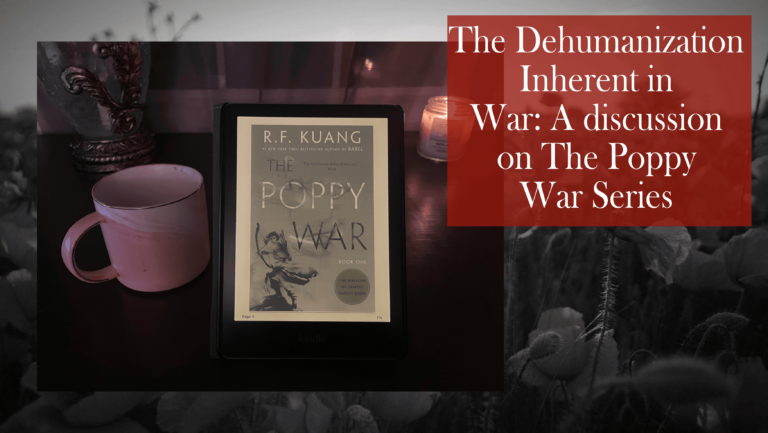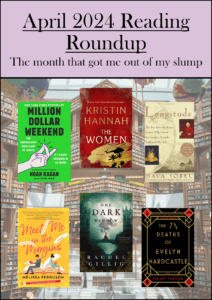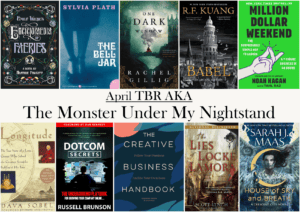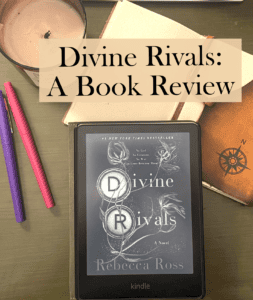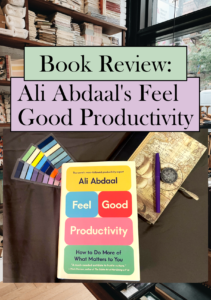This blog is reader-supported, meaning this page includes affiliate links. If you click and purchase, I may receive a small commission at no extra cost to you. I only recommend books and travel tools I love. Thank you for your support!
The Poppy War series, by R.F. Kuang, has the book community in turmoil. Readers have recommended it as dark academia, enemies to lovers, young adult, new adult, high fantasy, or low fantasy. No one knows where to put it, but most agree it is a must-read. This electrifying trilogy brings the realities of war, courage, and sacrifice to life. People who love history, heart-wrenching stories, or just a good book will love this series.
I recommend that you check the trigger warnings before delving into this series. R.F. Kuang does not shy away from the brutality of war and ensures you can’t either. I believe the scenes in the book are important, and not for a shock factor, but if you are queasy about graphic violence and gore I would not recommend this series to you.
Synopsis
The Poppy War series takes place in dystopian China and loosely follows the events of the Chinese-Sino War, and the Chinese Civil War. Fang Runin, Rin, is a girl from the Rooster Province in the South. She escapes an arranged marriage by testing into an elite military academy, seemingly grasping her dream.
Once she arrives, she realizes there are forces underway that she doesn’t understand. When her country is invaded, she is thrust into a war completely unprepared and attempts to navigate the murky waters of war, politics, relationships, and morals that steadily cease to exist.
Review
This trilogy astounded me. I’ve read hundreds of books in my life and I’ve read very few that have affected me to the point where I’m thinking about it weeks, even months, later. This series is a journey you may regret taking, just because it makes you feel all the ways you don’t want to.
Rin, the main character, is not someone I would call likable. My opinion of her steadily deteriorated as the books progressed. The same traits that made her so endearing in the beginning, persistent, stubborn, and single-minded, made her unbearable in the end. While oftentimes I would drop the book and be done, RF Kuang did this right: Rin was utterly unbearable and completely understandable. Rin had convincing reasons for every decision I hated, supported every morally questionable action, and justified every hateful thought she had. Rin is the complex and morally gray female character everyone wants, and Kuang delivers.
I wish I could give each of the other characters their own paragraph. Nezha, Kittay, Venka, Atlan, plus the dozen others that had fleshed-out personalities and amazing character arcs. The author meticulously crafted every character, giving each of them motivations, fears, and ambitions of their own. I fell in love with some, hated others, and understood all of them. Kuang has a gift for making each person feel real.
The pacing of the book was mostly great. Some parts dragged, but it felt like a way to allow the reader to take a breather before starting the next set of traumatizing scenes. Even the slower parts felt purposeful, it helped acknowledge the humanity of the people fighting in the war or develop the relationships of the characters. I’m willing to read slower books, as long as they still add something to the story, so this wasn’t something that took away from the series for me.
Her writing is stunning, and her ability to flow from one scene to the next is incredible. I never felt like there was an awkward transition between scenes or clunky dialogue. I felt like I was reading an epic fantasy without the struggle of reading seven books and learning an entire world’s backstory and languages. Kuang easily explained the few new words and placed them in the story at just the right time. It was easy to follow, and she painted a vivid picture of both the setting and the character’s actions.
Pacing, characters, and prose can make a book five stars, but Kuang took these books a step further. She took the hard things in history, and war, and made us look it in the eye. Kuang showed how dehumanization can happen so quickly in war, and how easy it is to get drunk on power. We were shown the impossible choices in history, and we could suddenly understand how people can make such horrendous ones.
The Massacre of Golyn Niis (spoilers)
Anyone who has read The Poppy War can contest, the Golyn Niis scene will follow them forever. The massacre of Golyn Niis is where we get our true first show of war. I could never accurately describe the gory scenes of what the Mugenese did to the citizens of Golyn Niis; this wasn’t a city take-over, but an absolute animal slaughter.
In this scene, we get the first taste of the message that would follow for the rest of the books. The other side, whoever they are, are not human. They are less than us, they are less than animals and can be slaughtered as such.
By making the reader see the atrocities of war, we wonder how people could ever think like this. The conclusions to draw are easy but intensely uncomfortable. To an extent, most people in war understand why countries dehumanize the opposition. Rin is no exception, saying, “Maybe that was just how murder became possible. You took away someone’s humanity, and then you killed them… But maybe if you looked at someone as not an object but an animal, you could not only commit the murder without flinching, you could let yourself take some pleasure in it.”
Understanding did not, does not, lead to change. Rin continued to burn through Mugenese soldiers in the very next scene. “If they were Mugenese, that meant they were crickets and that meant when she crushed them under her heel, the universe hardly registered their loss.” This was the heartbreaking experience of the books, we could see understanding, thought, and yet it didn’t matter. It was war, and war means we must kill.
Rin’s relationship with her leaders (spoilers)
Rin’s relationship with her leaders, and in leading, was fascinating. In Singuard Academy, after her first high marks in the class, she realizes she was desperate for the praise of her teachers, saying “She adored praise — craved it, needed it, and realized she found relief only when she had it.” She works outrageously hard just for an approving glance or word from her Masters and starts all over again as soon as they prepare for the next test. In Singuard, this serves her. She was one of the top performers in her class, with some of the highest marks. Her classmates respected her, despite her differences that they previously looked down on her for.
Her strength became her weakness as a soldier. She blindly followed Altan into Chuluu Korikh and released a dangerous God, despite Chaghan and Jiang’s warnings. After destroying the Mugenese, she joined Jin Vaisra’s revolution, despite hardly believing in the cause. She allowed herself to be experimented on at the request of Vaisra. The first two books consisted of Rin following her leaders, while hardly ever questioning why and what they were doing. She made the perfect foot soldier, which led to disastrous results. A sinister god was released, her country became further colonized, and Rin was betrayed by the very people she fought for.
Then, her lack of good leadership led to her being a terrible leader. She failed miserably during her short reign as head of the Cike; two people abandoned the post because of her, and she allowed the rest of them to be disbanded without a fight. In The Burning God, she became a competent general, and a brilliant strategist to get people to join her side, but she still never became a true leader. Rin focused on defeating the enemy to the point where she never saw the value of her people. She used and discarded people, never considering what was going to happen after the war until the war ended.
Even then, she pushed for another war, despite her crumbling and starving country, despite the fact her people had just gone through three consecutive wars. She couldn’t see an end to the brutality of war, just more bloodshed that would take place. “She could see the future and its shape was already drawn, predetermined by patterns that had been set in motion before she was born — patterns of cruelty and dehumanization and oppression and trauma…”
Her relationship with her leaders harmed her confidence, independence, and decision-making capabilities. Only her friendship with Kitay, her one pure relationship, saved her. Kitay gave her any sense of humanity she had, leading her to the final decision she would ever make. The decision that gave her country a final shot at survival, even if it meant ending hers.
Conclusion of The Poppy War
Books are my escape, they bring me into a fake world so I can avoid the real one. The Poppy War series wasn’t one of these books. It put a mirror up and forced me to reflect on human nature and the cost of our decisions. Books like these aren’t always fun or easy to read, but they’re important for different reasons. The importance is in looking back on history and remembering, and learning, from the actions and atrocities of our past.
For those readers who loved The Hunger Games for not only the story but also what it said, I cannot recommend The Poppy War series enough. The characters are complex and calloused, the plot is gripping, and the books tell a story of lives that make us think back on our own.
Interested in buying the book? Click below and buy The Poppy War from bookshop.org, a website that works to connect readers to independent booksellers. Stay brave!

